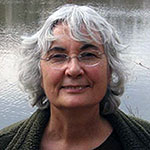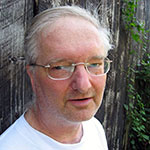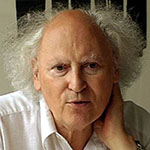every day I you
every day I you
the words are short or long
but all mingle to make
us tellers
of our story a sentence
that grows us and verbs us
so that everything moves and takes us
our language is
ahead of us
because it only comes to hear us
that’s why we don’t sleep much
and our words sleep far less
c’est tous les jours que je toi
les mots sont courts ou s’allongent
mais tous se mêlent pour faire
de nous des récitants
de notre récit une phrase
qui nous dérive et nous verbe
tellement tout bouge et nous prend
que notre langage est
en avant de nous
car il ne vient que d’entendre
c’est pourquoi nous dormons peu
et nos mots bien moins que nous
from Jamais et un jour (Never and a Day),Dominique Bedou, 1986.
I was told about an end of the world where the trees bend
I was told about an end of the world where the trees bend
under the weight of butterflies
when they arrive to breed
a single species
only there
here surrounded by the shouts the beats of a night club
that place I have never seen replaces
the tables with vases containing plastic flowers
because the nowhere of desire
now dwells in the middle of the café among
the faces
the butterfly tree
on m’a parlé d’un bout du monde où les arbres se courbent
on m’a parlé d’un bout du monde où les arbres se courbent
sous le poids des papillons
quand ils viennent s’y reproduire
une seule espèce
seulement là
ici dans les cris les coups d’un bar de nuit
ce lieu que je n’ai jamais vu prend la place
des tables des verres des plantes en plastique
car le nulle part du désir
met maintenant au milieu du café au milieu
des visages
l’arbre à papillons
from Nous le passage (We the Passage), Verdier, 1990
Translator’s Note:
The translations are the result of a collaboration between a poet (Don Boes) and a translator (Gaby Bedetti). Our project has been to translate a few poems from each of Meschonnic’s nineteen collections for a Selected Poems of Henri Meschonnic. We chose this sampling from that manuscript to represent the richness, range, and intensity of his poetic output in his nineteen collections.
Previously, six poems from Voyageurs de la voix (Voyagers of the Voice) were translated in “Jewish Poets of France,” Shirim: A Jewish Poetry Journal, vol. 7, no. 2, Oct. 1988. Our translations seem to be the first English translation since then of Meschonnic’s stripped down voice. As with the poems of Philippe Lacoue-Labarthe and Jacques Réda, the rhythm of Meschonnic’s poems exposes the subject. He follows Montaigne’s practice—“I do not describe being. I describe the passage… from minute to minute.” Meschonnic’s poems follow Montaigne—“I do not describe being. I describe the passage… from minute to minute.” Untitled and unpunctuated, his poems are kin to W. S. Merwin “climbing out of myself/ all my life.” Meschonnic writes, “I am not in what/ I seek but in what escapes me.”
Our challenge as translators was to capture the continuous movement of the poems, a movement that suggests the possibility of passing energia from subject to subject, of inventing within language new ways of being with oneself, others, and the world. Replicating this movement in English texts was difficult. We could hear and feel the rhythm of the French. And, we thought, Meschonnic’s minimal vocabulary and relative lack of poetic features, such as images and metaphors (his poems are nearly adjective-free), suggested somewhat of a clear path from French to English. However, we soon realized his rhythms and condensed language was in the service of mapping voices, not poems. His use of enjambment and only the most colloquial verbs and nouns made us take a hard look at individual words (no matter their simplicity) and therefore, the world. In translating these poems, we became, like Meschonnic, that accomplished innovator, “patients of life.”

Gabriella Bedetti studied translation at the University of Iowa and the Sewanee Writers’ Conference. Her translations of Meschonnic’s essays and other writings have appeared in New Literary History, Critical Inquiry, and Diacritics. Meschonnic was a guest of the MLA at her roundtable with Ralph Cohen and Susan Stewart.

Don Boes is the author of Good Luck With That, Railroad Crossing, and The Eighth Continent, selected by A. R. Ammons for the Samuel French Morse Poetry Prize. His poems have appeared in The Louisville Review, Painted Bride Quarterly, Prairie Schooner, CutBank, Zone 3, Southern Indiana Review, and The Cincinnati Review.

Henri Meschonnic (1932–2009) is a key figure of French “new poetics,” best known worldwide for his translations from the Old Testament and the 710-page Critique du rythme. During his long career, Meschonnic generated controversy in the literary community. His poems appear in more than a dozen languages; however, almost none of Meschonnic’s poems have been translated into English. His poetry has received prestigious awards, including the Max Jacob International Poetry Prize, the Mallarmé Prize, the Jean Arp Francophone Literature Prize, and the Guillevic-Ville de Saint-Malo Grand Prize for Poetry.

 BACK TO ISSUE
BACK TO ISSUE